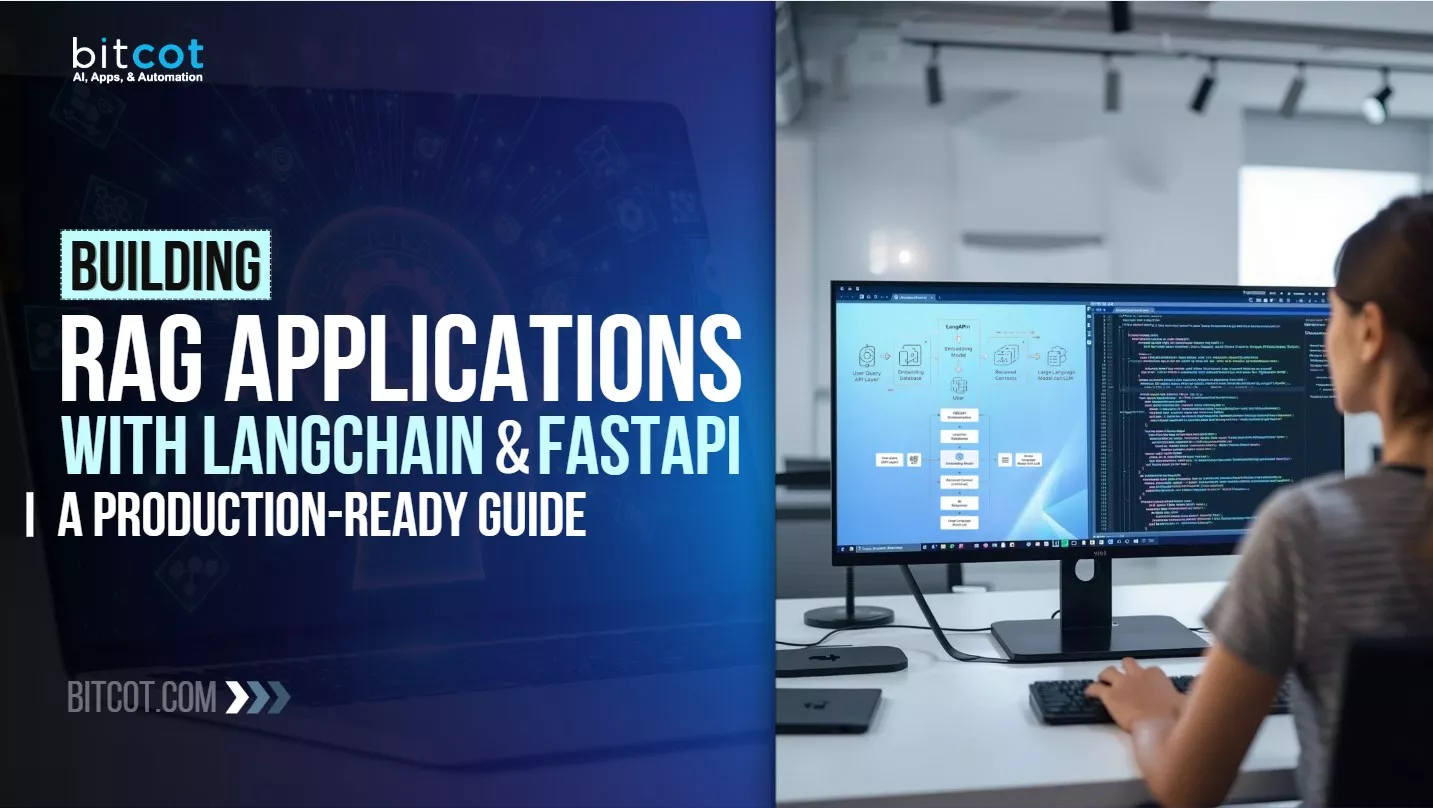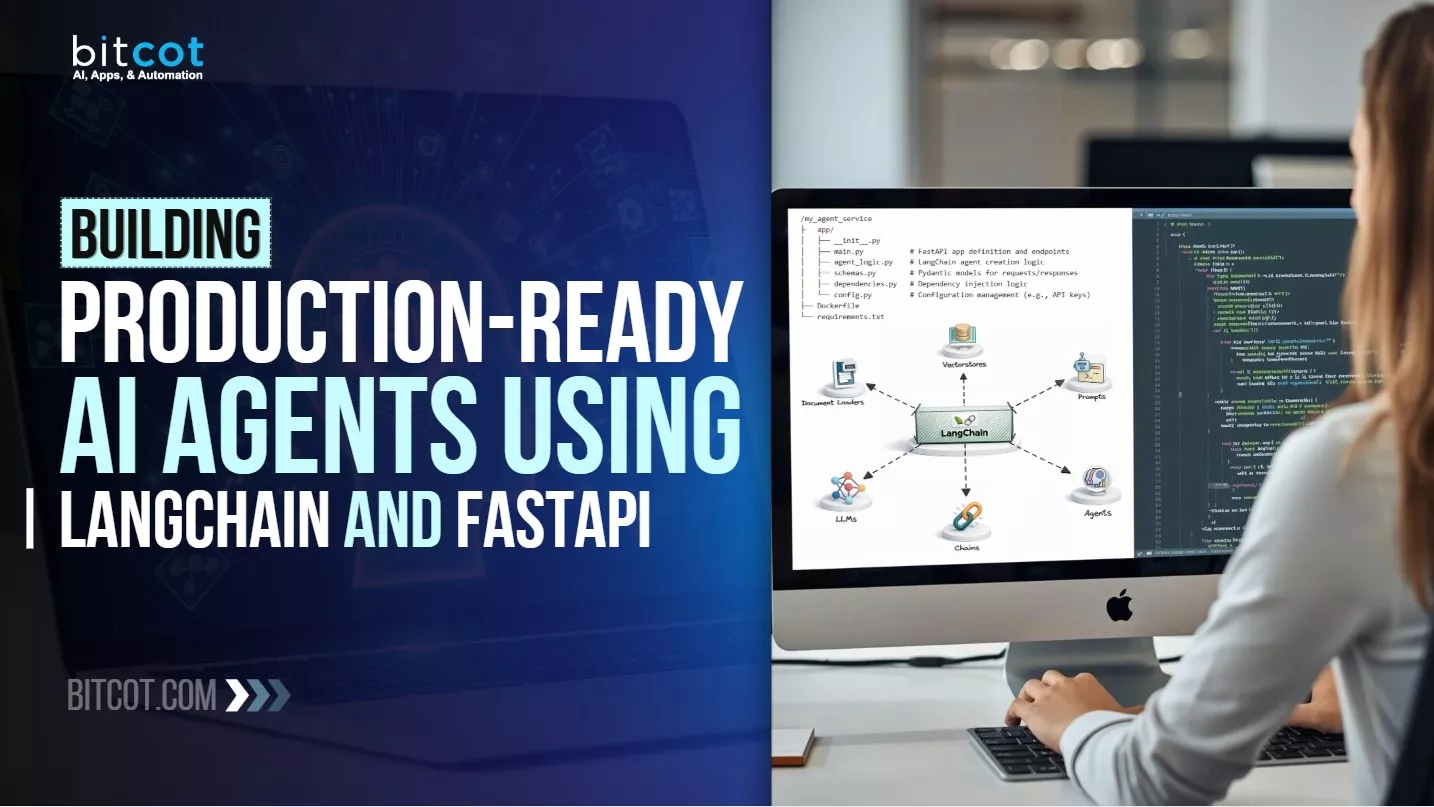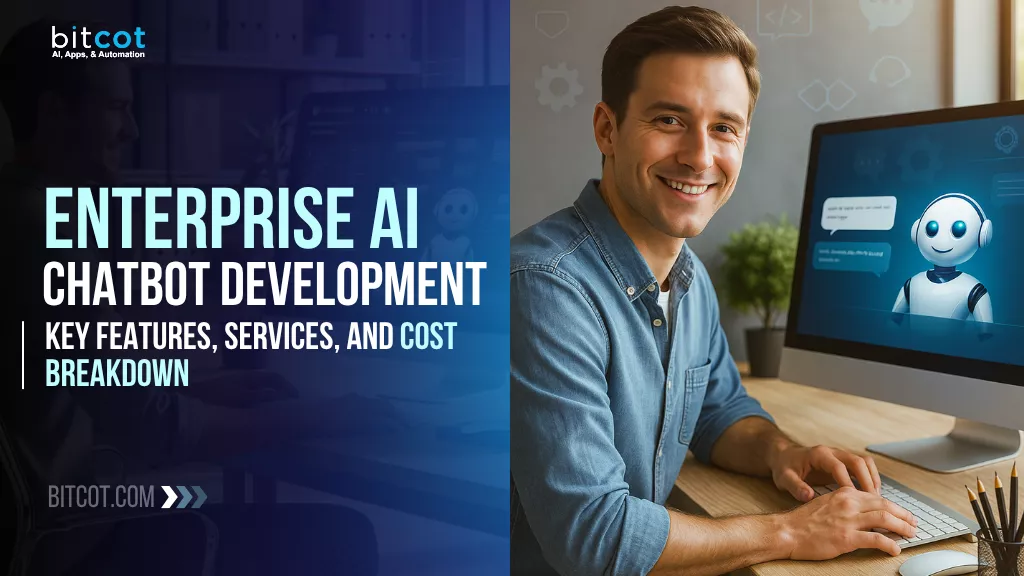
Your employees, partners, and customers all need answers, fast.
From internal help desks and HR portals to customer apps and websites, everyone expects instant, accurate responses around the clock.
But if your systems, data, and workflows don’t talk to each other, every query becomes a bottleneck. Your teams waste hours managing repetitive requests and switching between tools. Your customers wait, your employees get frustrated, and your efficiency drops.
Sound familiar?
In 2025-26, enterprises are turning to AI-powered chatbots; not as simple FAQ tools, but as intelligent assistants that understand context, learn from data, and integrate deeply into your business systems. For example, the booming tech sector in San Jose, California, relies on such advanced solutions to manage their massive internal and external communication flows.
In this post, we’ll walk you through how enterprise AI chatbot development works, including key features, essential services, and a detailed cost breakdown to help you plan your investment wisely.
You’ll see what differentiates an enterprise-grade chatbot from a basic one, from natural language understanding and omnichannel support to integration with CRMs, ERPs, and internal knowledge bases.
Ask yourself:
- How much time does your team spend answering repetitive questions?
- How often do customers wait longer than they should for support?
- And what would it mean if your chatbot could resolve 70% of those interactions automatically?
Whether you’re exploring AI for the first time or upgrading an existing system, this guide will show you exactly what to expect.
Bitcot helps enterprises design and deploy chatbots that do more than just chat; they automate workflows, streamline operations, and improve customer experiences at scale.
The enterprise AI chatbot revolution is already underway.
The question is: how ready is your organization to lead it?
What is Enterprise AI Chatbot Development?
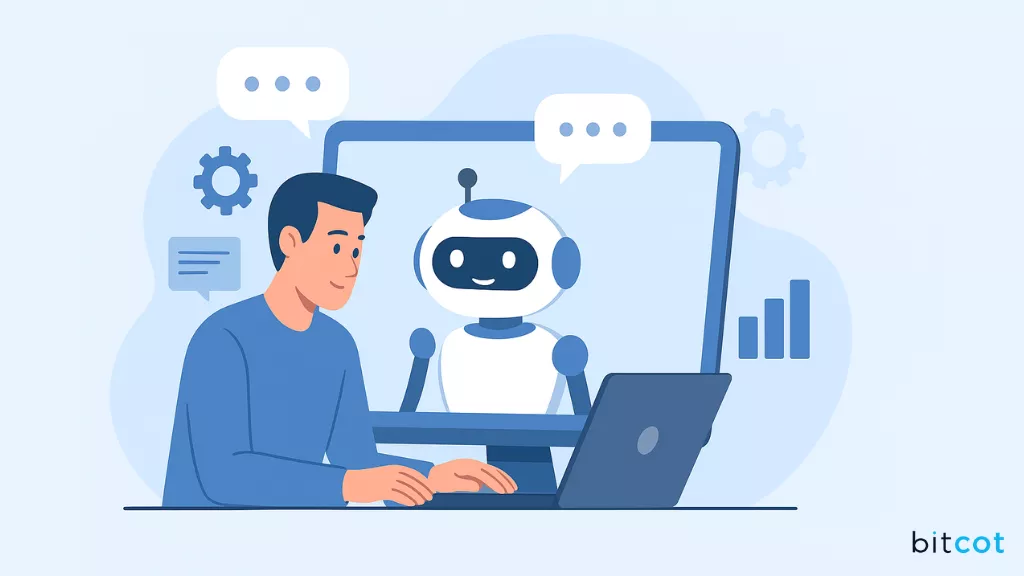
Enterprise AI chatbot development is the process of creating intelligent, scalable virtual assistants specifically designed for the complex needs of large organizations.
These chatbots are not just simple tools for answering FAQs; they act as digital team members, seamlessly connecting customers, employees, and business systems to automate communication and streamline workflows across multiple departments.
Unlike traditional rule-based chatbots that respond only to predefined questions, enterprise AI chatbots leverage Natural Language Processing (NLP), machine learning, and contextual understanding.
This enables them to interpret complex queries, provide personalized responses, and even perform actions such as retrieving data from a CRM, updating support tickets, scheduling appointments, or initiating internal approvals.
Essentially, they don’t just respond; they understand, learn, and execute tasks, making interactions more meaningful and productive.
These chatbots can be deployed across multiple channels, such as websites, mobile apps, messaging platforms like WhatsApp, Slack, or Microsoft Teams, and social media, ensuring a consistent experience for customers and employees alike. For enterprises, this capability is critical because communication is rarely confined to a single platform.
Enterprise AI chatbots also integrate deeply with existing business tools like Salesforce, SAP, ServiceNow, or internal knowledge bases. This integration allows them to access real-time data, provide actionable insights, and automate repetitive tasks that would otherwise consume employee time and slow down operations.
The ultimate goal of enterprise AI chatbot development is to enhance efficiency, improve user experiences, and deliver measurable business outcomes. These bots reduce manual workloads, increase productivity, and provide intelligent, 24/7 support.
In short, enterprise AI chatbots are more than virtual assistants; they are digital workforce enablers that help businesses scale smarter, faster, and more effectively.
Key Features of Enterprise AI Chatbot Development
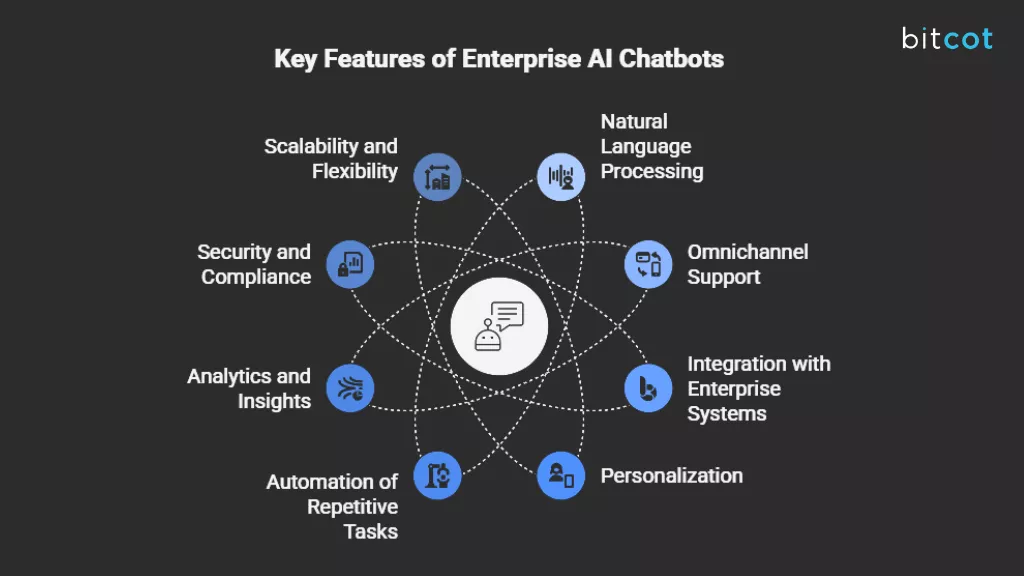
Enterprise AI chatbots go far beyond simple question-and-answer functionality.
They combine intelligence, automation, and integration to enhance business operations while delivering smooth, consistent experiences for customers and employees.
Here are the key features:
1. Natural Language Processing (NLP) and Understanding
At the heart of enterprise AI chatbots is Natural Language Processing (NLP). NLP enables the chatbot to understand user intent, context, and even sentiment. This allows it to handle multi-turn conversations, interpret complex questions, and provide human-like responses. With NLP, users can interact naturally without following rigid scripts, making the experience more intuitive and efficient.
2. Omnichannel Support
Enterprise chatbots are designed to operate across multiple communication channels. From websites and mobile apps to messaging platforms like WhatsApp, Slack, and social media, the chatbot ensures a consistent experience for users wherever they engage. This omnichannel approach eliminates gaps in communication and allows businesses to maintain a single, unified point of interaction.
3. Integration with Enterprise Systems
A critical feature is the ability to integrate with enterprise systems such as CRMs, ERPs, HR platforms, and internal knowledge bases. This integration allows the chatbot to fetch real-time data, update records, initiate workflows, and automate internal processes, reducing manual work for employees while ensuring data accuracy and efficiency across the organization.
For instance, a major logistics company in Long Beach, California, uses this feature to seamlessly connect its customer support bot to its proprietary shipping software.
4. Personalization
Enterprise AI chatbots use historical interactions and customer data to provide personalized responses. They can recommend products, services, or solutions based on previous behavior and preferences. This personalization not only enhances the user experience but also increases engagement, customer satisfaction, and loyalty by delivering interactions that feel tailored.
5. Automation of Repetitive Tasks
These chatbots can handle a wide range of routine tasks, including answering FAQs, scheduling appointments, creating tickets, and retrieving data. By automating repetitive tasks, they free up employees to focus on higher-value work, increase operational efficiency, and reduce human error, making the entire support system faster and more reliable.
6. Analytics and Insights
Enterprise AI chatbots provide detailed analytics and insights on user behavior, interaction patterns, response times, and satisfaction metrics. Businesses can use this data to identify trends, optimize workflows, and improve decision-making, ensuring continuous improvement in both customer support and internal operations.
7. Security and Compliance
Security and compliance are essential for enterprise chatbots. They adhere to industry-standard security protocols and follow compliance regulations to protect sensitive customer and company data. Features like access control, data encryption, and secure authentication ensure that interactions are safe while maintaining regulatory standards.
This is especially crucial for financial services firms in cities like San Francisco.
8. Scalability and Flexibility
Enterprise chatbots are built to scale with growing business needs. They can manage increasing interaction volumes, adapt to new use cases, and expand to additional channels or departments. This flexibility allows organizations to evolve their chatbot capabilities without rebuilding from scratch, ensuring long-term value and consistent performance.
Practical Use Cases of Enterprise AI Chatbot Development
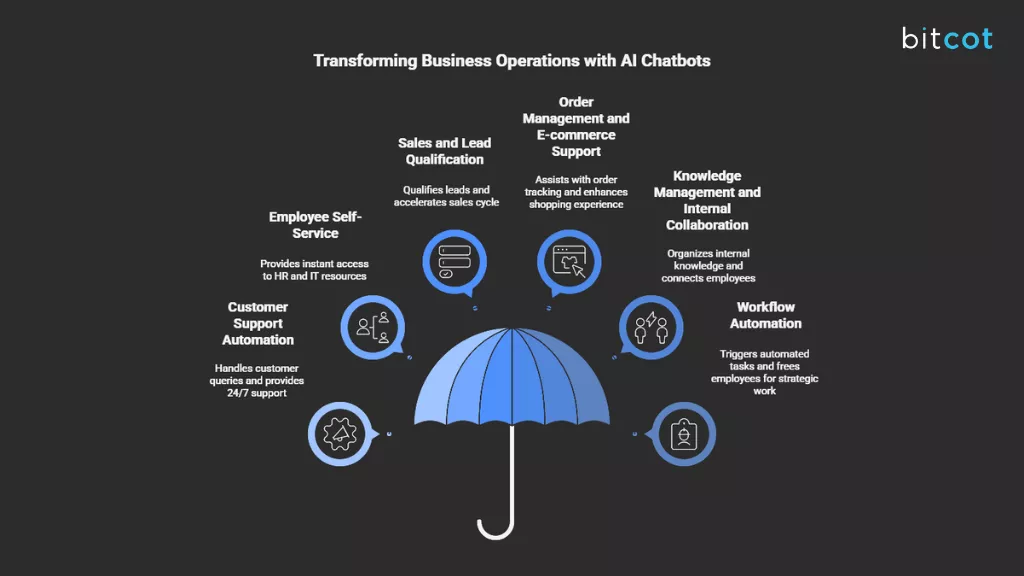
Enterprise AI chatbots are no longer just futuristic concepts; they are actively transforming how businesses operate across industries.
By combining intelligence, automation, and integration, these chatbots solve real problems and create measurable value.
Here are some practical use cases where enterprise AI chatbots make a difference:
1. Customer Support Automation
Enterprise chatbots handle high volumes of customer queries across multiple channels like websites, mobile apps, and messaging platforms. They can answer FAQs, track orders, resolve complaints, and provide 24/7 support. This reduces response times and improves customer satisfaction.
This reduces response times and improves customer satisfaction, a key metric for large retailers, including those operating near Anaheim.
2. Employee Self-Service
Internal teams benefit from chatbots that provide instant access to HR, IT, and operational resources. Employees can request leave, retrieve payroll information, troubleshoot IT issues, or access internal policies directly through the chatbot, minimizing back-and-forth communication. This boosts HR efficiency for huge workforces in places like Los Angeles.
3. Sales and Lead Qualification
AI chatbots can interact with potential customers, gather essential information, and qualify leads automatically. By asking targeted questions and assessing responses, the chatbot ensures that sales teams only engage with high-quality prospects, accelerating the sales cycle and boosting conversions.
4. Order Management and E-commerce Support
In retail and e-commerce, chatbots assist customers with tracking orders, processing returns, checking inventory, and providing product recommendations. They streamline transactions, reduce cart abandonment, and enhance the shopping experience, all while operating around the clock. This is vital for businesses with vast supply chains, such as those in Oakland.
5. Knowledge Management and Internal Collaboration
Chatbots help organizations access and organize internal knowledge. They can pull documents, summarize information, or connect employees to the right subject matter experts. This reduces time wasted searching for information and encourages more efficient collaboration across teams. The government sector in Sacramento, for example, benefits greatly from streamlined workflows.
6. Workflow Automation
Enterprise chatbots can trigger automated workflows based on user interactions, such as creating tickets, updating records, or sending notifications. This ensures that repetitive tasks are handled accurately and consistently, freeing employees for strategic work.
Core Services Involved in Enterprise AI Chatbot Development
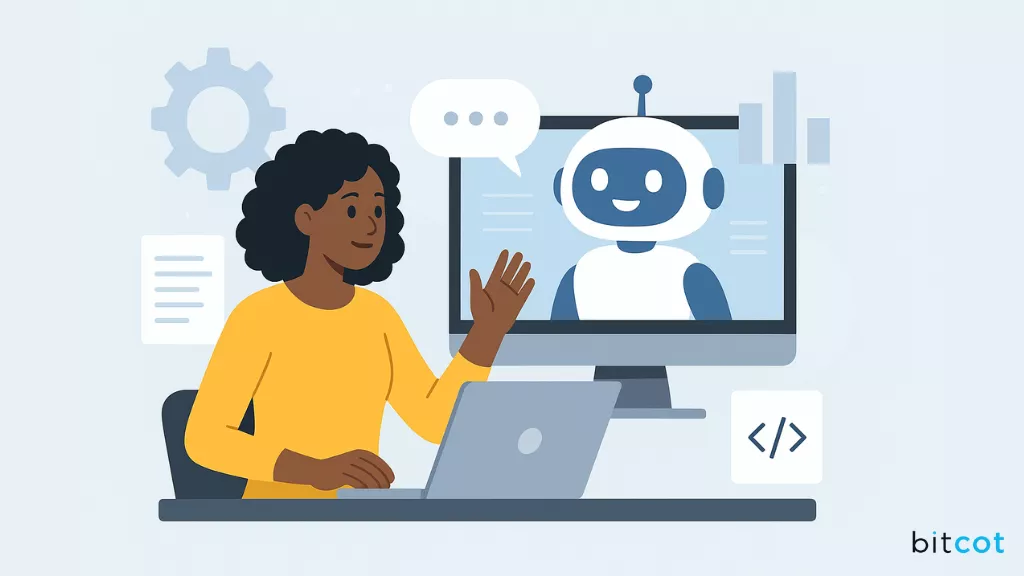
Developing an enterprise AI chatbot requires a series of specialized services to ensure it is intelligent, scalable, secure, and fully aligned with business needs.
Each service plays a crucial role in creating a solution that improves efficiency, enhances customer experiences, and drives measurable business outcomes.
1. Consultation and Requirement Analysis
This initial phase involves working closely with stakeholders to understand business objectives, user needs, and key pain points. It includes evaluating existing systems, identifying integration requirements, defining chatbot use cases, and setting measurable KPIs. Thorough requirement analysis ensures that the chatbot solution is purpose-built.
2. Conversational Design and NLP Training
Conversational design ensures the chatbot communicates naturally and effectively. Experts create dialog flows, intents, and entity recognition models, while AI engineers train the bot using NLP and machine learning. This allows the chatbot to interpret complex queries, manage multi-turn conversations, and respond accurately in human-like ways.
3. System Integration
Integration with enterprise systems is essential for operational efficiency. Chatbots connect with CRMs, ERPs, HR platforms, and internal knowledge bases to fetch and update data in real time. This allows the chatbot to trigger automated workflows, provide actionable insights, and complete tasks without manual intervention, ensuring that employees and customers receive accurate information.
This level of integration is essential for large institutions in San Diego.
4. Omnichannel Deployment
Enterprise chatbots are deployed across multiple communication channels, including websites, mobile apps, WhatsApp, Slack, Teams, and social media platforms. An omnichannel chatbot deployment ensures a consistent and seamless user experience, allowing users to interact with the chatbot wherever they are. It also enables businesses to maintain unified communication and engagement.
5. Security and Compliance Implementation
Protecting sensitive data is a top priority. Chatbot developers implement data encryption, secure authentication, role-based access controls, and regulatory compliance protocols. These measures ensure that interactions remain secure, sensitive information is protected, and the enterprise meets industry regulations, building trust with both customers and employees while reducing risk exposure.
6. Testing, Optimization, and Continuous Improvement
Before and after deployment, chatbots undergo rigorous testing for accuracy, response quality, and system integration. Post-launch, performance analytics and user feedback are analyzed to continuously optimize the chatbot, improve workflows, expand capabilities, and adapt to evolving business processes, ensuring the solution remains effective, relevant, and valuable over time.
For example, the agriculture sector in Fresno utilizes continuous improvement to adapt their bots to seasonal query variations.
7. Maintenance and Support
Ongoing maintenance ensures the chatbot remains up-to-date, secure, and capable of handling new requirements. Support services include software updates, bug fixes, performance monitoring, and scaling for increased usage. This continuous care guarantees that the chatbot maintains reliability, efficiency, and high-quality interactions as the organization grows and business needs evolve.
Cost Breakdown of Enterprise AI Chatbot Development
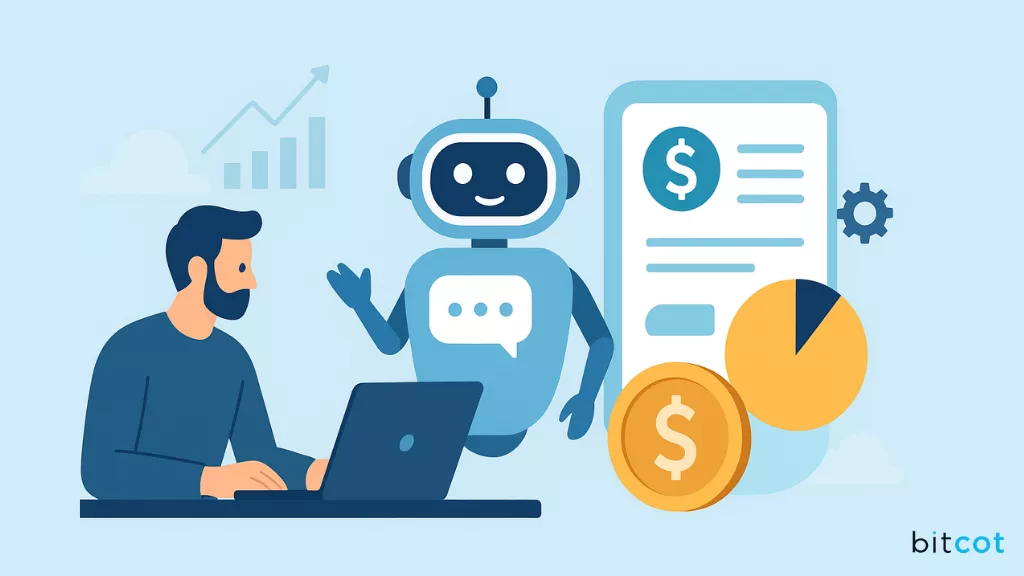
The price tag for an enterprise AI chatbot is anything but static. While a simple, rule-based chatbot for an FAQ might cost just a few thousand dollars, a highly customized, fully integrated, enterprise-grade Generative AI solution can cost upwards of $500,000 and even into the millions.
The total expenditure is a function of the bot’s complexity, the development approach, and ongoing operational needs.
1. Initial Development Cost by Complexity
The most significant factor influencing the initial build cost is the chatbot’s sophistication and the underlying AI model.
| Chatbot Type | Key Features | Estimated Cost Range (One-time Build) |
| Basic Rule-Based Bot | Predefined scripts, simple FAQ handling, basic lead capture. | $5,000-$15,000 |
| Mid-Tier AI Bot (NLP) | Natural Language Processing (NLP), contextual understanding, simple integrations (e.g., CRM). | $15,000-$50,000 |
| Advanced Enterprise AI | Complex machine learning models, custom AI training, multiple systems integration, sentiment analysis, multi-language support. | $50,000-$200,000+ |
| Generative AI Solutions | Large Language Model (LLM) fine-tuning, complex, dynamic problem-solving, advanced security, proprietary data integration. | $150,000-$500,000+ |
2. Phase-Wise Cost Allocation
Regardless of the total budget, the investment typically breaks down across key development phases:
- Strategy & Planning (10-15%): This involves defining clear use cases, mapping conversation flows (User Experience/Conversation Design), defining the technical architecture, and creating an MVP (Minimum Viable Product) scope.
- Core AI and Backend Development (40-50%): This is the largest component, covering the development and training of the AI/NLP/ML models, creating the core business logic, and building the backend infrastructure.
- Frontend & Integration Work (15-25%): This covers creating the user interface (UI), connecting the chatbot to all necessary enterprise systems (CRM, ERP, payment gateways, etc.) via APIs, and deploying across multiple channels (web, mobile app, social media). Complex, secure integrations can significantly push costs higher.
- QA, Testing, and Optimization (10-15%): Comprehensive testing of conversation accuracy, performance, load handling, and security before launch.
3. Major Cost Drivers
Several critical factors determine where your project will fall within the wide cost ranges:
A. Customization & Integration
The chatbot’s ability to seamlessly integrate with your existing internal enterprise systems (e.g., pulling up real-time customer data from a CRM) is a major cost factor. Custom integrations are labor-intensive and require specialized security protocols.
B. Data and AI Training
The cost of data preparation and model training increases dramatically with complexity. A more advanced AI bot requires:
- Larger, cleaner, and better-annotated datasets specific to your industry and business processes.
- Fine-tuning of pre-trained LLMs (for Generative AI) or building custom models, which requires significant computational resources.
This is particularly true for highly specialized industries in the USA.
C. Development Team Location
The hourly rate for developers is heavily influenced by geography. For a custom build, outsourcing to regions with lower developer rates (e.g., parts of Asia or Eastern Europe) can significantly reduce the cost compared to hiring a North American-based team.
4. Ongoing Operational Costs
The total cost of ownership extends far beyond the initial build. You must budget for recurring expenses to keep the bot operational and effective:
| Cost Component | Estimated Monthly/Annual Expense | Description |
| Hosting & Infrastructure | $500-$5,000+ monthly | Cloud service fees (AWS, Azure, GCP) based on storage, traffic, and processing load. |
| AI Service Costs (APIs) | $50-$10,000+ monthly | Usage fees for third-party services like OpenAI, Dialogflow, or IBM Watson, which are often charged per API call or token usage. |
| Maintenance & Updates | 15-20% of initial cost annually | Essential for bug fixes, platform updates, security patches, and maintaining API compatibility. |
| AI Model Retraining | Variable, can be substantial | Continuously training the AI model with new data to maintain and improve accuracy and relevance over time. |
This is a necessity for large-scale operations in places like Bakersfield.
By breaking down the investment into these components, such as initial build phases, complexity tiers, and recurring costs, enterprises can create a realistic budget and ensure their AI chatbot strategy delivers a strong Return on Investment (ROI).
Also Read: Top 10 AI Chatbot Development Platforms and Tools
Partner with Bitcot to Build Your Custom Enterprise AI Chatbot
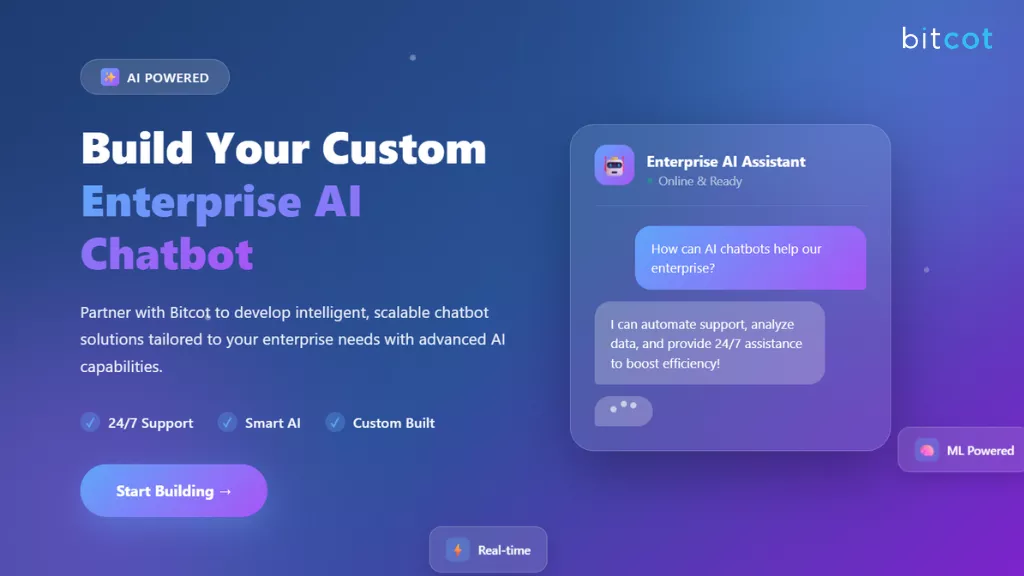
Choosing the right partner determines the success of your enterprise AI chatbot.
Bitcot combines technical expertise, industry knowledge, and a results-driven approach to deliver solutions that empower teams, delight customers, and drive measurable growth.
Here’s why businesses choose us:
- Deep Industry Expertise: Bitcot has extensive experience in building enterprise-grade AI chatbots across multiple industries. We understand complex business workflows, integration challenges, and customer expectations, ensuring your chatbot is not only functional but also strategically aligned with your business goals.
- Custom, Scalable Solutions: We design chatbots tailored to your unique needs, with the ability to scale as your business grows. From multi-turn conversations and omnichannel support to system integrations and advanced AI features, our solutions evolve with your organization, ensuring long-term value.
- Seamless System Integration: Bitcot ensures your chatbot connects with CRMs, ERPs, HR platforms, and internal knowledge bases. This integration allows real-time data access, automated workflows, and consistent interactions, reducing manual workloads and improving operational efficiency across teams.
- User-Centric Conversational Design: We prioritize the user experience, designing intuitive dialogs, contextual responses, and personalized interactions. This approach ensures your chatbot engages both customers and employees effectively, delivering meaningful interactions that strengthen relationships and boost satisfaction.
- Ongoing Support and Optimization: Bitcot doesn’t stop at deployment. We provide continuous monitoring, optimization, and updates to ensure your chatbot remains secure, efficient, and aligned with evolving business needs, maximizing ROI and sustaining high performance over time.
- Proven Results and ROI: Our chatbots are designed to drive measurable business outcomes, from faster response times and increased productivity to improved customer satisfaction. Partnering with Bitcot means investing in a solution that delivers real impact and tangible growth for your enterprise.
Partnering with Bitcot means more than just building a chatbot; it’s about creating an intelligent, scalable digital assistant that empowers your business, supports your teams, and delights your customers.
Final Thoughts
Enterprise AI chatbots are no longer a “nice-to-have”; they’re becoming the backbone of efficient customer support, streamlined operations, and smarter business decisions.
From automating repetitive tasks to delivering personalized experiences across multiple channels, a well-designed chatbot can save time, reduce errors, and keep your customers happy.
But building the right chatbot isn’t just about technology; it’s about strategy, integration, and understanding your users’ needs.
That’s where a partner like Bitcot comes in.
We specialize in custom AI chatbot development services for enterprises, creating solutions that not only solve problems but also scale with your business.
If you’re ready to transform how your business engages with customers and empowers your team, it’s time to take the next step. Partner with Bitcot and start building a chatbot that’s intelligent, efficient, and designed for measurable results.
Get in touch with our team today to explore your custom enterprise AI chatbot solution.




